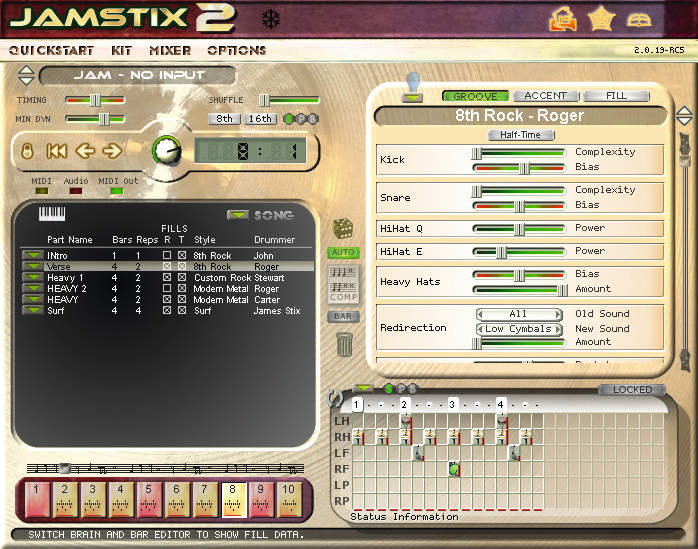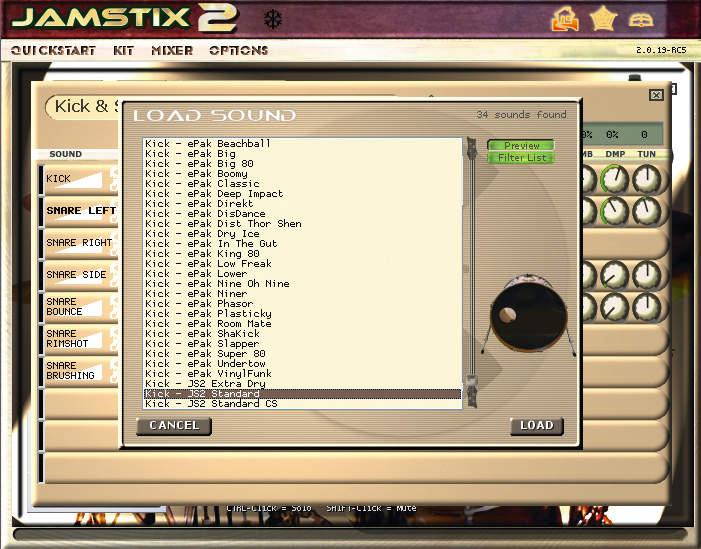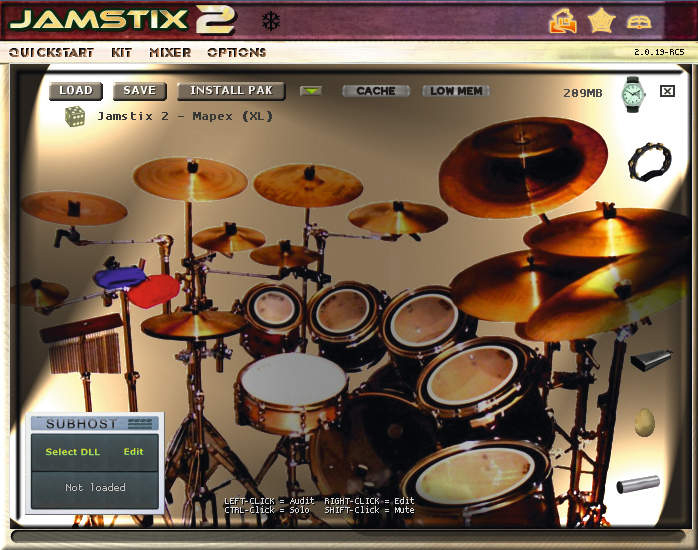MusicRadar Verdict
Jamstix 2 is fun and inspirational, with each of the virtual drummers doing a fantastic job of interpreting the various styles in its own unique way. A steal at this price.
Pros
- +
Flexible performance. Third-party plug-in hosting. Simple MIDI export. Great drummer modelling. Informative manual.
Cons
- -
Limited standard library. Still only for PC.
MusicRadar's got your back



The current crop of drum kit sample libraries and plug-ins are great if you can program beats like a drummer, but what if you can't? Using stock patterns can sound incredibly stiff, and working with full-on audio loops now feels prehistoric.
Jamstix is designed to provide a better solution, offering what amounts to an intelligent playing generator combined with a library of onboard sounds. The software also has the ability to trigger other drum kit plug-ins.
Following various version 1 updates, Rayzoon decided the whole Jamstix concept needed a rebuild from the ground up, hence the new-look Jamstix 2. This is as feature-packed as its predecessor, but the idea is that it's now much easier to get to grips with.
Summary
Jamstix 2 combines both style and drummer modelling to create realistic performances. The basic building blocks are song parts (eg, verse, chorus and so on), and these are arranged in an on-screen song sheet. This plays in sync with your host sequencer, firing off sounds from the loaded kit.
Each part can be any style you choose, and its length and repetition is set by you so that you can build up the structure you want. Parts can be assigned to one of ten drummers, each of whom has their own particular style. Most are designed to exhibit the characteristic rhythmic traits of a well-known drummer, with the name giving you a clue as to who this might be.
To give you an example, the description for 'John' explains that "this drummer has very interesting groove habits, accents and fill strategies", and that "special emphasis is given to triplet-based accents and fill patterns". Other drummers include 'Stewart', 'Phil' and 'Carter'.
Want all the hottest music and gear news, reviews, deals, features and more, direct to your inbox? Sign up here.
To get you up and running, Rayzoon has included a bunch of 'quickstart' template songs with common structures for various styles.
In use
It's very easy to treat Jamstix like a session drummer, telling it what you'd like to hear in each section. A four-bar jazz intro followed by an eight-bar rock verse, heading into a modern metal chorus by way of a one-bar bossa nova bridge? No problem.
However, what all this fails to explain is that Jamstix 2 can actually compose parts for you on the fly. What's more, unless you 'lock' the created bars, it'll continue to generate fresh content based on the data it receives, and it does this using its appropriately named 'brain'.
There are many ways to influence the brain, both statically and in real time. It can make use of both audio and MIDI inputs via the 'jam with audio' and 'jam with MIDI' modes. These enable real-time jamming; when you start to play harder, the drummer reacts, upping the power and intensity of the performance.
Next up, you can tweak on-screen parameters such as Shuffle and Timing on a per-bar, part or song basis, and this adds further realism. Jamstix even takes into account the four-limbed nature of the human drummer, working out whether they could realistically move their hand from drum A to drum B to play a certain rhythm, modifying its output so that only humanly playable beats are heard. Now, that's clever!
However, possibly the most impressive aspect of Jamstix 2 is the brain's tight integration with the kit elements and playing.
Load up a style and the brain gives you a set of parameters to modify that's based on that particular style. So for Funk you get, among other things, Amount and Power parameters for your kick and snare, as well as the suitably-titled Funkiness. Tweak these as Jamstix 2 plays and it recomposes each bar accordingly.
For each drummer you also get a bunch of controls that relate to their playing style. Possibly the most important is Feel, with its associated timing and velocity parameters, as this dictates whether the drummer tends to play ahead of or behind the beat.
When you bear in mind that you've also got a collection of parameters that controls the composition of accents and fills as well as the main groove, and that there's always the option to go into the bar editor and modify everything on a single-hit basis, you can see how it's possible to carefully tailor every part of your song.
Not perfect
One downside to Jamstix's scientific approach to drum composition is that it sits slightly uncomfortably with its new interface, and its sheer flexibility can sometimes leave you wondering what it's actually doing. For this reason, it certainly pays to read the manual in full.
If Jamstix 2 does have a real Achilles heel, though, it's the onboard sound library. The single included kit is decent, but you'll definitely want more, and this means paying extra to get the XL pack (buying it bundled is an option).
Of course, if you've got other plug-in libraries to plunder, then you're laughing, thanks to the VST plug-in support, and if this isn't an option, you can simply drag parts, bars or the whole song to a MIDI channel for triggering your standard samplers.
Furthermore, with MIDI pattern import also available, you can use Jamstix's virtual drummers to breathe life into existing drum patterns.
You might not want to get rid of your drummer just yet, but for $99 you can't go wrong with Jamstix 2.
MusicRadar is the number 1 website for music makers of all kinds, be they guitarists, drummers, keyboard players, djs or producers...
GEAR: We help musicians find the best gear with top-ranking gear round-ups and high- quality, authoritative reviews by a wide team of highly experienced experts.
TIPS: We also provide tuition, from bite-sized tips to advanced work-outs and guidance from recognised musicians and stars.
STARS: We talk to musicians and stars about their creative processes, and the nuts and bolts of their gear and technique. We give fans an insight into the actual craft of music making that no other music website can.
